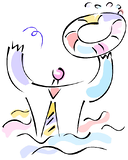If I had a dime for every self-deprecating thought that passed through my head in this lifetime, I would be rich beyond my wildest dreams. And my hunch is that many of you would be too. How many times did I think I was wrong, unlovable, dumb, lacking talent, and just not good enough?
lifetime, I would be rich beyond my wildest dreams. And my hunch is that many of you would be too. How many times did I think I was wrong, unlovable, dumb, lacking talent, and just not good enough?
What’s up with that? Sure we make mistakes and we’re not perfect. But who is? In fact, for the most part, we are good, decent people who wish to contribute to each other in meaningful ways.
So why are we so capable at beating ourselves up with negative talk?
Having spent much of my life seeking equanimity, I found this simple truth:
There is nothing “defective” or “flawed” about me - or you!
Rather, we are addicted to “stinking thinking!” Over the years, we’ve developed negative thinking patterns that inform our feelings, which in turn, motivate much of our behavior.
This is usually how it goes: thoughts lead to feelings, feelings lead to behaviors and behaviors lead to consequences. Consequences typically reinforce the thoughts that lead to feelings. And the cycle begins again.
We didn’t get here alone. We’ve had lots of help forming negative thoughts. Parents, family, media, and even teachers were among the many misinformed who helped us to develop ideas like “I’m not good enough” or “I should be different than who I was born to be.” Of course blaming others doesn’t solve anything, nor does passively awaiting rescue while we lick our wounds. What does help? Mindful awareness and curiosity. Can you stop judging yourself and wonder instead, “Why am I thinking this way? What do I really want?”
In short, the key is awareness and shifting perspective. Next time you notice a negative thought, can you question its validity and then reframe it? Generally, if you dig around, you will uncover a positive or protective desire underneath the feelings that lead to your behaviors. Once you know that, you can strategize how to better meet your needs.
Here are a few examples:
- When you think you didn’t do enough, maybe it’s because you truly have a desire to contribute and want reassurance that you are contributing sufficiently. How might you get that reassurance in a more productive way, rather than berating yourself?
- When you decide to react negatively to your partner, are you feeling scared that he or she doesn’t love you or understand you? Is it possible that you want to protect yourself and that when you said the wrong thing; maybe you just wanted to be heard or seen for who you really are? Could you have had that discussion in a different way without blaming him or her or yourself?
Translated, can you appreciate and acknowledge the good in you? Know that it is there. Most of us are just trying to do our best, as tender, vulnerable human beings. We are afraid of being hurt, or hurting others, of not being or doing enough, or maybe doing or being too much. Very few of us wake up and think “I want to do a crappy job today”, or “I want to act like a jerk.”
Can you begin to tease out the positive longings behind your negative feelings and behaviors? Can you name them with honesty and kindness for yourself and others? And maybe handle situations that arise in a more life affirming and productive way?
I can’t say that you can change this overnight, but just becoming aware of the possibility can start you on a path to joyful change. There are also lots of resources for healing and personal growth, including mindfulness practices, nonviolent communication, coaching and a host of therapeutic techniques. As you embark on this process, you can begin to alter neural pathways – and that means that behavior change can become progressively easier.
I wish you much joy, peace, and success! Here are some resources for you to explore on your journey to self-acceptance and self-realization:
Finding Your Own North Star, by Martha Beck
Nonviolent Communication by Marshall Rosenberg
What Happy People Know by Dan Baker

